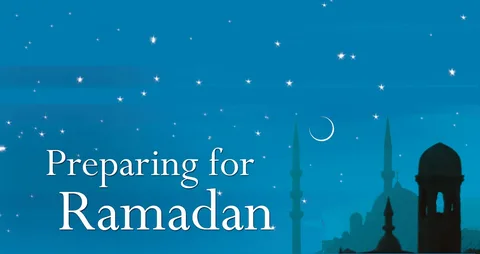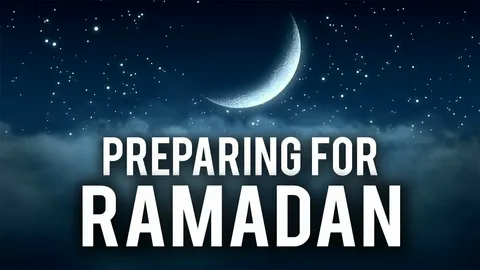Ramadan, known as the holiest month in Islam, is a period of fasting, prayer, reflection, and community for millions of Muslims worldwide. It commemorates the revelation of the Quran to the Prophet Muhammad (peace be upon him) and holds immense spiritual significance in the Islamic faith, in this article on Arabian Tongue we will explorer how to prepare for ramadan.
Ramadan holds immense importance in Islam for several reasons:
- Spiritual Renewal: Ramadan is a time for Muslims to renew their spiritual commitment and strengthen their relationship with Allah. The act of fasting, abstaining from food, drink, and other physical needs from dawn until sunset, serves as a reminder of the importance of self-discipline, self-control, and empathy for those less fortunate.
- Opportunity for Forgiveness: It is believed that during Ramadan, Allah’s mercy and forgiveness are abundant. Muslims strive to seek forgiveness for past sins and to purify their hearts and souls through acts of worship, charity, and self-reflection.
- Quranic Revelation: Ramadan is the month in which the Quran, the holy book of Islam, was first revealed to the Prophet Muhammad (peace be upon him) through the Angel Gabriel. Therefore, it holds special significance as a time for increased recitation, reflection, and study of the Quran.
- Community and Solidarity: Ramadan fosters a sense of community and solidarity among Muslims worldwide. Muslims come together to break their fasts at iftar meals, often sharing food with neighbors, family, and those in need. This communal aspect strengthens bonds and promotes unity within the Muslim community.
- Self-Discipline and Character Building: Fasting during Ramadan teaches Muslims self-discipline, patience, and perseverance. By refraining from physical needs during daylight hours, individuals learn to control their desires and focus on spiritual growth. This practice also cultivates empathy and compassion for the less fortunate.
- Opportunity for Reflection and Gratitude: Ramadan provides a dedicated time for Muslims to reflect on their lives, their relationship with Allah, and their purpose in the world. It encourages gratitude for blessings and serves as a reminder of the importance of humility and gratitude in one’s daily life.
- Rewards and Blessings: It is believed that the rewards for good deeds performed during Ramadan are multiplied manifold. Muslims are encouraged to engage in acts of worship, charity, and kindness to maximize the blessings of the month and earn spiritual rewards.
Understanding the Significance of Preparation
Preparation for Ramadan is more than just about refraining from food and drink during daylight hours. It involves mental, physical, and spiritual readiness to fully benefit from the blessings of this sacred month.
how to prepare for ramadan

Preparation for Ramadan is essential for Muslims as it’s a time of spiritual reflection, self-discipline, and devotion. Here are some key aspects of why preparation is significant:
Physical Preparation
One of the key aspects of preparing for Ramadan is adjusting one’s physical routine to accommodate the fasting hours. This includes gradually shifting meal schedules to ensure adequate nutrition and hydration during Suhoor (pre-dawn meal) and Iftar (breaking of fast). A balanced diet comprising complex carbohydrates, proteins, fruits, and vegetables is essential to sustain energy levels throughout the day.
Spiritual Preparation
Preparing spiritually for Ramadan entails setting specific goals to enhance one’s relationship with the Creator. This can involve increasing acts of worship such as prayer, reading the Quran, and engaging in supplication. Additionally, cultivating a mindset of mindfulness and gratitude helps individuals derive deeper spiritual benefits from their fasting experience.
Educating Yourself
Before the onset of Ramadan, it’s beneficial to educate oneself about the rituals and practices associated with this blessed month. This includes studying the Quran and Hadith to gain a deeper understanding of the significance of fasting and the virtues of Ramadan.
Creating a Ramadan Schedule
To make the most of Ramadan, it’s essential to create a structured schedule that allows for dedicated time for worship, reflection, and rest. Balancing religious obligations with work, family, and other commitments ensures a fulfilling and productive month.
Seeking Forgiveness and Reconciliation
Ramadan is a time for self-reflection and purification of the soul. Before the start of Ramadan, it’s important to reconcile with others and seek forgiveness for any wrongdoings. Resolving conflicts and extending forgiveness fosters a sense of peace and unity within the community.
Stocking Up on Essentials
As Ramadan approaches, stocking up on essential food items and groceries for Suhoor and Iftar meals is crucial. Planning and preparing nutritious meals in advance can alleviate stress and ensure a smooth fasting experience.
Decluttering and Organizing
Creating a clean and organized living environment contributes to a sense of tranquility and focus during Ramadan. Decluttering spaces and simplifying daily routines free up time for spiritual pursuits and self-improvement.
Community Involvement
Active participation in communal prayers and gatherings strengthens bonds within the Muslim community. Volunteering for charitable causes and supporting those in need exemplifies the spirit of generosity and compassion synonymous with Ramadan.
Physical and Mental Health
Prioritizing physical and mental well-being during Ramadan is essential for maintaining vitality and spiritual clarity. Incorporating regular exercise, adequate sleep, and stress-management techniques helps individuals navigate the physical and emotional challenges of fasting.
Reflection and Gratitude
Ramadan provides a unique opportunity for introspection and self-evaluation. Taking time to reflect on personal growth and express gratitude for blessings fosters a sense of humility and appreciation for the abundance in one’s life.
Staying Connected
In an increasingly digital world, staying connected with loved ones during Ramadan is easier than ever. Utilizing technology for virtual gatherings, sharing Ramadan greetings, and participating in online religious lectures fosters a sense of community and belonging.
Preparing for Eid
As Ramadan draws to a close, preparations for Eid-ul-Fitr, the festival marking the end of fasting, begin. Planning festivities, purchasing gifts, and preparing special meals for Eid celebrations adds to the anticipation and joy of this auspicious occasion.
Learn Now: Quran Recitation online Course For Kids
FAQs
What is the significance of Suhoor and Iftar during Ramadan?
Suhoor, the pre-dawn meal, provides sustenance to fasters throughout the day, while Iftar, the meal to break the fast at sunset, symbolizes gratitude and celebration.
How can I stay motivated to maintain my spiritual practices during Ramadan?
Setting achievable goals, seeking support from peers, and regularly reminding oneself of the rewards of Ramadan can help maintain motivation throughout the month.
Is it permissible to fast while traveling during Ramadan?
Islamic scholars have differing opinions on fasting while traveling. It's advisable to consult with a knowledgeable religious authority for guidance based on individual circumstances.
What are some recommended acts of worship during the last ten days of Ramadan?
Engaging in additional prayers (Taraweeh), reciting Quran, and seeking Laylat al-Qadr (Night of Power) are highly recommended during the last ten days of Ramadan.
How can non-Muslims support their Muslim friends and colleagues during Ramadan?
Showing understanding and respect for fasting practices, refraining from eating or drinking in front of fasting individuals, and offering words of encouragement are meaningful ways to support Muslim friends and colleagues during Ramadan.
Conclusion
In conclusion, preparing for Ramadan involves a holistic approach encompassing physical, spiritual, and communal readiness. By focusing on self-improvement, fostering unity within the community, and deepening one’s connection with the Divine, individuals can embark on a transformative journey during this blessed month.


